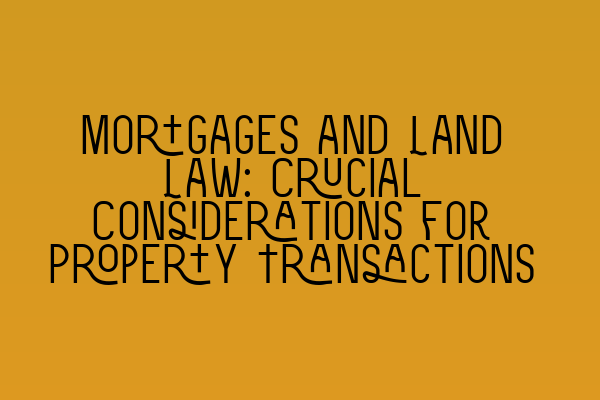Mortgages and Land Law: Crucial Considerations for Property Transactions
When it comes to property transactions, mortgages play a vital role in facilitating the purchase of real estate. Whether you’re a first-time homebuyer or a seasoned investor, understanding the crucial considerations of mortgages and land law is essential to ensure a smooth and successful property transaction.
What is a Mortgage?
A mortgage is a legal agreement between a borrower and a lender that enables the borrower to finance the purchase of a property. In exchange for the funds provided by the lender, the borrower pledges the property as collateral. If the borrower fails to repay the loan as agreed, the lender has the right to seize and sell the property to recover the outstanding debt.
Mortgages are typically long-term loans that are repaid in installments over a specified period, often spanning 15 to 30 years. The terms and conditions of a mortgage can vary, including the interest rate, repayment schedule, and any additional fees or penalties.
Types of Mortgages
There are several types of mortgages available in the market, each with its own advantages and considerations. Understanding the different types can help you make an informed decision:
- Fixed-Rate Mortgage: A fixed-rate mortgage offers a stable interest rate throughout the loan term, providing predictability and ease of budgeting. This type of mortgage is ideal for individuals who prefer a consistent monthly payment.
- Adjustable-Rate Mortgage (ARM): An adjustable-rate mortgage features an interest rate that fluctuates based on market conditions. Typically, the initial rate is lower than that of a fixed-rate mortgage but can increase over time. An ARM can be beneficial for those planning to sell or refinance before the rate adjusts.
- Interest-Only Mortgage: With an interest-only mortgage, the borrower only pays the interest on the loan for a specific period, typically up to ten years. This option allows for lower monthly payments during the interest-only period but may result in higher payments once the principal repayment begins.
- Government-Backed Mortgages: Government-backed mortgages, such as FHA loans or VA loans, are insured by federal agencies and often offer more favorable terms, lower down payment requirements, and flexible eligibility criteria.
Each type of mortgage has its pros and cons, so it’s crucial to assess your financial situation and consider your long-term goals before deciding on the most suitable option.
Important Considerations in Land Law
In addition to understanding the various types of mortgages, it’s essential to consider the legal aspects of land law that are inherent in property transactions:
- Title Search: Conducting a thorough title search is crucial to ensure that the property’s title is clear and free from any encumbrances or disputes. A qualified solicitor can help you navigate this process and identify any potential issues that may affect your ownership rights.
- Encumbrances: It’s crucial to be aware of any encumbrances or restrictions on the property, such as easements, liens, or restrictive covenants. These encumbrances can impact property use and may restrict certain activities or modifications.
- Planning and Zoning: Understanding the local planning and zoning regulations is essential, as they dictate the permissible use and development of the property. Failure to comply with these regulations can result in fines or even forced demolition of non-compliant structures.
- Stamp Duty: Stamp duty is a tax imposed on property transactions and is calculated based on the property’s value. It’s essential to factor in these costs when budgeting for a property purchase.
- Land Registry: Registering the property with the land registry is a crucial step to establish your ownership rights and protect against any potential fraudulent claims.
Ensuring compliance with land law regulations can help you avoid legal complications and safeguard your investment in the long run.
Working with a Solicitor for Property Transactions
Given the complexity and potential risks involved in property transactions, it’s highly advisable to engage the services of a knowledgeable solicitor who specializes in property and land law. A solicitor can guide you through the legal process, carry out necessary searches and due diligence, and ensure that all legal requirements are met.
At SQE Property Law & Land Law, our team of experienced solicitors can assist you with all aspects of property transactions, including mortgages and land law considerations. Contact us today to discuss your property needs and set your transaction on the path to success.
Related Articles:
